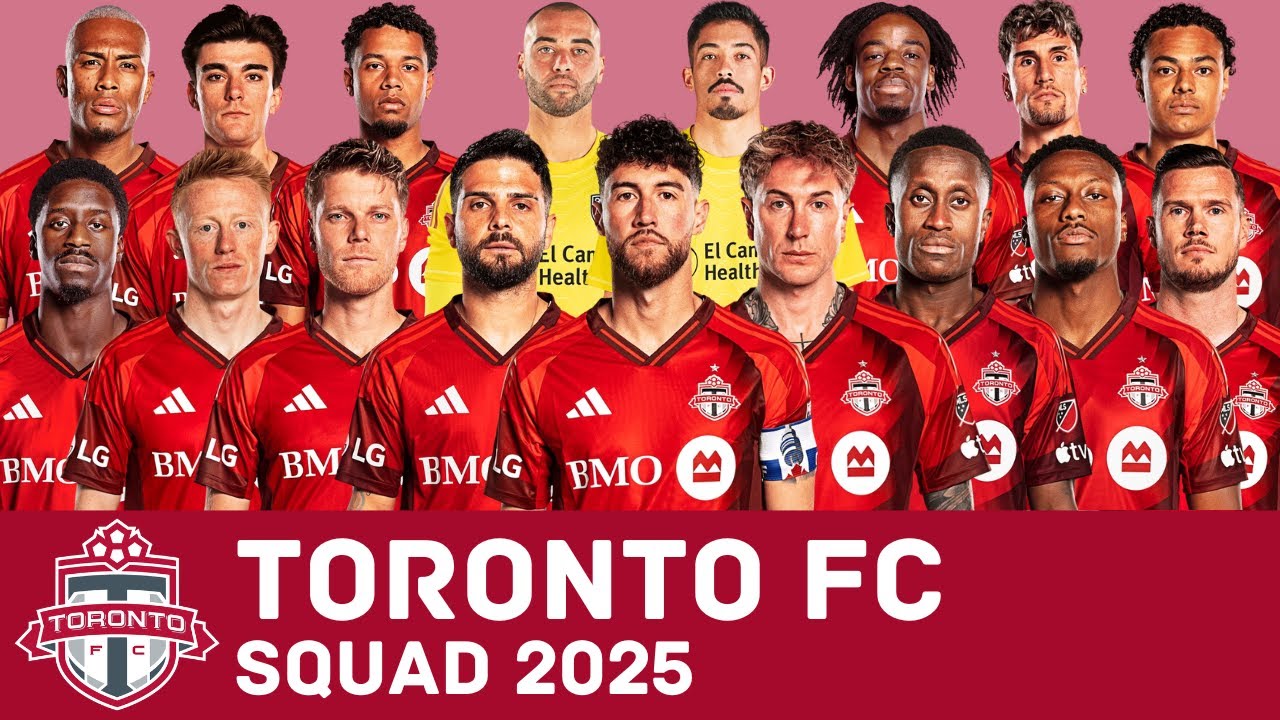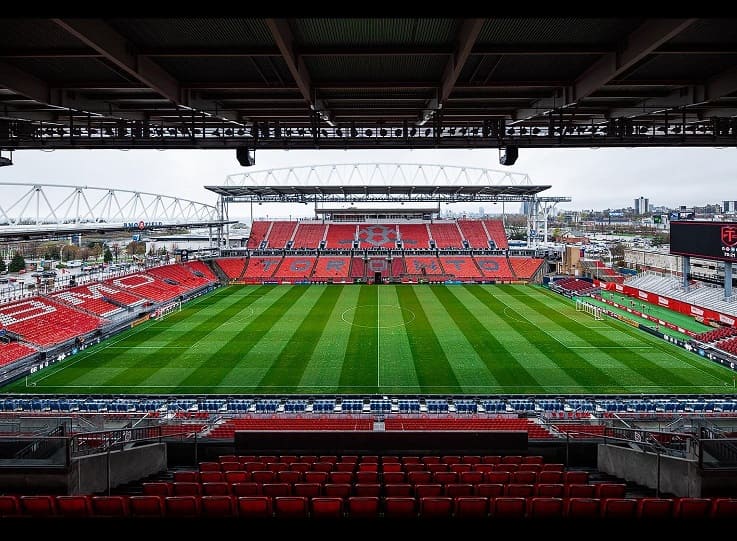MLS
Toronto FC: Building Canada’s Soccer Powerhouse

Toronto FC: Building Canada’s Soccer Powerhouse
Toronto FC, commonly known as TFC, is one of Major League Soccer’s flagship franchises and a symbol of professional soccer in Canada. Founded in 2005, the club played its inaugural MLS season in 2007, becoming the first Canadian team in the league. The team was created to bring top-level soccer to Toronto, a city with a diverse and passionate sports culture, while also representing Canada in the growing North American soccer landscape.
From the outset, TFC focused on building a competitive, internationally recognized team. Its early years were characterized by growing pains, with incremental improvements as they established their identity in MLS. The club’s management placed strong emphasis on international talent recruitment, youth development, and fostering a strong connection with Toronto’s multicultural fanbase. This early vision helped set the foundation for a club that would become a national symbol for Canadian soccer and a beacon for young players aspiring to professional careers.
The early years were challenging on the pitch. Toronto FC initially struggled to find consistency and identity, cycling through managers and players while learning the competitive demands of MLS. However, incremental investments and strategic player acquisitions gradually paid off, helping the club establish a foundation for future success. The arrival of internationally recognized players like Dwayne De Rosario and later Michael Bradley brought both skill and leadership, gradually transforming Toronto FC into a competitive side capable of challenging the Eastern Conference.
The turning point for TFC came under Greg Vanney, who was appointed head coach in 2014. Vanney’s tenure marked a tactical evolution, focusing on possession-based attacking football, high pressing, and a disciplined defensive structure. During this period, TFC became a model for sustained success in MLS, demonstrating the importance of long-term planning, player development, and tactical cohesion.
One of the most significant chapters in TFC history is the era of Sebastian Giovinco, who joined the club in 2015. Giovinco’s skill, creativity, and goal-scoring ability transformed the team’s attacking dynamics. His partnership with Jozy Altidore and Michael Bradley created a formidable attacking trio that elevated Toronto FC to league-wide prominence. In 2017, TFC achieved historic success by winning the domestic treble, capturing the MLS Cup, Supporters’ Shield, and Canadian Championship in a single season—a first in Canadian professional sports history.
Trivia: Sebastian Giovinco, nicknamed “The Atomic Ant,” became TFC’s all-time leading scorer and is widely credited with putting Toronto FC on the international soccer map.
Toronto FC’s colors—red, grey, and white—reflect both the city’s sporting heritage and the team’s aggressive, attacking philosophy. The lion emblem represents courage, strength, and pride, tying the club’s identity to Toronto’s civic symbolism. Supporters’ groups like the Red Patch Boys, Tribal Rhythm Nation, and U-Sector have been central to TFC’s identity, creating some of the loudest and most organized fan culture in MLS.
The club’s commitment to youth development has been equally notable. The Toronto FC Academy, along with partnerships with local soccer organizations, has nurtured Canadian talent capable of competing at high levels domestically and internationally. Players like Jonathan Osorio, Doneil Henry, and Richie Laryea have emerged from these programs, emphasizing the club’s dedication to sustainable growth and local talent development.
Trivia: Toronto FC is the first Canadian team to win the MLS Cup, achieving the milestone in 2017, which not only solidified their place in league history but also marked a turning point for Canadian professional soccer.
Rivalries
Rivalries have been central to Toronto FC’s cultural and competitive identity. The most intense is with CF Montréal, known as the Canadian Classique. This rivalry transcends soccer, reflecting historical, cultural, and linguistic dynamics between English-speaking Toronto and French-speaking Montreal. Matches are fierce, drawing sell-out crowds, national media attention, and heated supporter engagement. These games often have playoff implications, adding extra intensity to each encounter.
Another prominent rivalry exists with Columbus Crew, rooted in frequent Eastern Conference clashes and playoff encounters. TFC and Columbus have shared memorable matches, including high-scoring affairs and dramatic finishes that have cemented the rivalry as a critical fixture in the club’s competitive calendar.
Toronto FC also maintains spirited rivalries with teams like New York Red Bulls, Atlanta United FC, and Orlando City SC. These matchups have been defined by both on-field drama and passionate fan engagement, contributing to Toronto FC’s reputation as a team that thrives in high-pressure situations.
Trivia: The Red Patch Boys, TFC’s largest supporters’ group, are responsible for creating massive choreographed tifos and chants that have become iconic in MLS, particularly during Canadian Classique matches against CF Montréal.
Toronto FC: Ownership
Toronto FC is owned by Maple Leaf Sports & Entertainment (MLSE), one of the most influential sports organizations in North America. MLSE also owns the Toronto Maple Leafs (NHL), Toronto Raptors (NBA), and Toronto Argonauts (CFL). MLSE’s ownership provides TFC with financial stability, access to state-of-the-art facilities, and world-class operational resources.
Under MLSE, Toronto FC has emphasized long-term growth, youth development, and community engagement. The organization has invested heavily in facilities, including training grounds and the academy, ensuring a strong pipeline of talent. MLSE’s multi-sport approach allows for cross-promotional opportunities, marketing synergy, and a consistent high standard of organizational professionalism.
Trivia: Toronto FC is the only MLS club owned by a multi-sport organization that also controls major NHL and NBA franchises, creating a unique cross-sport operational ecosystem that enhances both visibility and resources.

Watch Toronto FC
Toronto FC plays at BMO Field, a premier soccer-specific stadium in downtown Toronto. Opened in 2007 and extensively renovated for the 2015 FIFA Women’s World Cup and MLS seasons, BMO Field now seats approximately 30,000 spectators. The stadium features premium seating, modern amenities, and steep stands that ensure fans are close to the action.
The South Stand, home to the Red Patch Boys, is particularly notable for producing one of MLS’s most electric atmospheres. Coordinated chants, massive banners, and creative tifos transform BMO Field into a formidable environment for visiting teams, while also creating a sense of community for supporters.
BMO Field is also a venue for international friendlies, FIFA tournaments, and concerts, further embedding it as a central cultural hub in Toronto. Its downtown location allows fans easy access via public transportation, and the stadium’s integration into Toronto’s skyline has made it an architectural icon for soccer in North America.
Trivia: BMO Field was one of the first stadiums in North America to achieve FIFA certification for international matches, enabling it to host Gold Cup games, World Cup qualifiers, and prestigious international club friendlies.
Toronto FC: This Season
The 2025 MLS season finds Toronto FC blending international experience and homegrown talent under the leadership of head coach John Herdman. Herdman, previously known for managing the Canadian women’s national team, has brought tactical innovation, intensity, and an emphasis on youth development.
Key players include midfielder Alejandro Pozuelo, forward Jesús Jiménez, and Canadian stalwart Jonathan Osorio. Pozuelo provides creativity and vision, while Osorio’s leadership and experience offer stability and continuity. Young talents like Richie Laryea and emerging academy graduates add speed, energy, and unpredictability to the squad.
Toronto FC employs a possession-based style, emphasizing ball control, quick transitions, and fluid attacking movement. Defensively, the team maintains disciplined positioning while employing high pressing to disrupt opponents. Each Eastern Conference matchup carries weight, particularly rivalries against CF Montréal, Columbus Crew, and New York Red Bulls. Every fixture is both a tactical and symbolic challenge, demanding peak performance from players and staff.
Trivia: Alejandro Pozuelo, the Spanish playmaker, has consistently been among MLS’s top assist providers, showcasing TFC’s ability to attract and integrate world-class talent into the league.
Toronto FC: What to Follow
Several storylines will define Toronto FC’s trajectory in 2025 and beyond. Youth development remains crucial, with the academy continuing to supply both Canadian talent and international prospects. Homegrown players like Jonathan Osorio serve as role models, bridging the gap between academy and first team.
Supporter culture will continue to shape the club. The Red Patch Boys, Tribal Rhythm Nation, and U-Sector create matchday spectacles with coordinated chants, banners, and tifos, ensuring that TFC’s home games remain among the most vibrant experiences in MLS.
Competitive success remains a central goal. Toronto FC aims for consistent playoff appearances, Canadian Championship victories, and deeper runs in MLS Cup competition. Strategic acquisitions, tactical evolution, and squad development will be essential to maintaining competitiveness in a rapidly evolving league.
Trivia: Toronto FC is the first and only Canadian team to complete the domestic treble—winning the MLS Cup, Supporters’ Shield, and Canadian Championship in a single season (2017), cementing its status as a powerhouse in North American soccer.
Toronto FC represents a unique intersection of sporting excellence, cultural pride, and community engagement. From the streets of Toronto to the stadium chants of tens of thousands, TFC has built a lasting legacy that continues to inspire fans across Canada and beyond.
